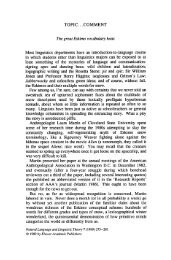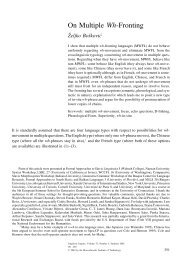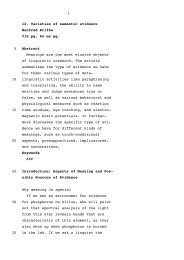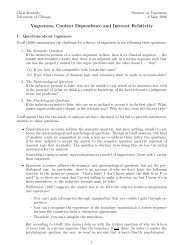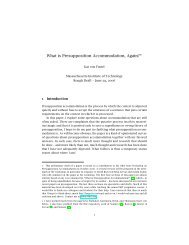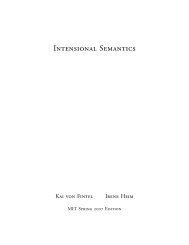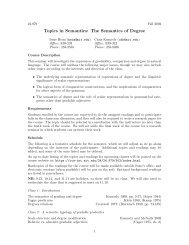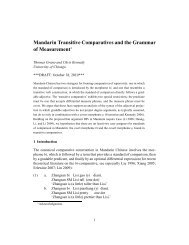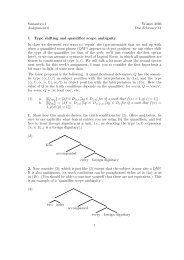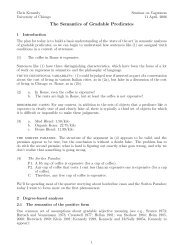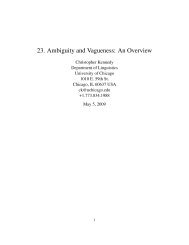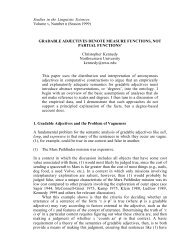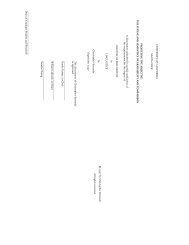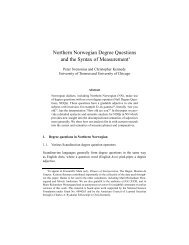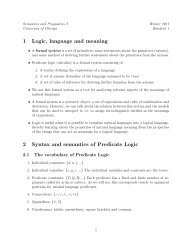On the natural history of negative polarity items - Syntax, Semantics ...
On the natural history of negative polarity items - Syntax, Semantics ...
On the natural history of negative polarity items - Syntax, Semantics ...
Create successful ePaper yourself
Turn your PDF publications into a flip-book with our unique Google optimized e-Paper software.
Raj Singh<br />
B: # He ate some <strong>of</strong> <strong>the</strong>m. In fact, he ate all <strong>of</strong> <strong>the</strong>m.<br />
(5) A: What did Mary eat at <strong>the</strong> party?<br />
B: # She ate beef or pork at <strong>the</strong> party. In fact, she ate both.<br />
B. Cancellation and Quantity: While it is commonly assumed that implicatures should be cancellable,<br />
we argue that this assumption is actually inconsistent with <strong>the</strong> neo-Gricean Maxim <strong>of</strong><br />
Quantity (NG-MQ). Here is a statement <strong>of</strong> NG-MQ modelled after (e.g., Gamut 1991, Fox 2007):<br />
If S, S’ are alternatives, both are relevant, and <strong>the</strong> speaker knows that both are true, <strong>the</strong>n if S’ is<br />
stronger than S, <strong>the</strong> speaker must assert S’. If it turns out that <strong>the</strong> speaker used S instead <strong>of</strong> S 0 , <strong>the</strong>n<br />
so long as <strong>the</strong>y are alternatives and are both relevant, it follows deductively (by modus tollens) that<br />
<strong>the</strong> speaker does not know that S 0 . Toge<strong>the</strong>r with <strong>the</strong> fur<strong>the</strong>r assumption that <strong>the</strong> speaker is opinionated<br />
about S 0 , it follows that ¬S 0 . What is important is that <strong>the</strong>re is no room for cancellation<br />
here; if <strong>the</strong> maxim is right, implicatures follow as deductive consequences <strong>of</strong> <strong>the</strong> assumption that<br />
<strong>the</strong> speaker is following <strong>the</strong> maxim. That is, it follows from NG-MQ that <strong>the</strong> only way for S 0 to<br />
not become an implicature <strong>of</strong> S is for S 0 to be treated as irrelevant when S is asserted. Thus, neo-<br />
Gricean <strong>the</strong>ories <strong>of</strong> implicature fare just as well on (1) and (2) as M’s exhaustivity-based proposal.<br />
C. Ignorance Inferences Cannot be Cancelled: Sentences ‘A or B’ and ‘if A, B’ are known<br />
to give rise to inferences that <strong>the</strong> speaker is ignorant about A (¬⇤SA ⌅ ¬⇤S¬A; abbreviate this<br />
as IS(A)) and is ignorant about B (e.g., Gazdar 1979, Sauerland 2004). If, as argued above,<br />
neo-Gricean reasoning is mandatory, <strong>the</strong>n, contrary to standard assumptions (e.g., Gazdar 1979),<br />
ignorance inferences (I-INFs) should also be mandatory and uncancellable. Here is some evidence<br />
that <strong>the</strong>y are (see also Sauerland 2004, Singh 2010, Magri 2011):<br />
(6a) John has two or more sons. # In fact, he has more than two sons.<br />
(6b) # If John is married to an American, he has two sons. # In fact, he has two sons.<br />
Since <strong>the</strong> ignorance inferences <strong>of</strong> ‘A or B’ and ‘if A, B’ arise whe<strong>the</strong>r or not <strong>the</strong>y are parsed with<br />
exh (Fox 2007), (6a,b) show that neo-Gricean reasoning is mandatory whe<strong>the</strong>r or not exh exists.<br />
D. Deriving Hurford’s Constraint We have argued that an explanation <strong>of</strong> <strong>the</strong> data above does not<br />
demand <strong>the</strong> existence <strong>of</strong> exh. The existence <strong>of</strong> exh has, however, been supported by a pattern <strong>of</strong><br />
data surrounding Hurford’s Constraint (HC, Hurford 1974) and its obviation (e.g., Chierchia et al.<br />
2008). HC states that disjunctions ‘A or B’ are odd if one <strong>of</strong> <strong>the</strong> disjuncts entails <strong>the</strong> o<strong>the</strong>r.<br />
(7) # John was born in Paris <strong>of</strong> France (P ⇧ F ; note that, given common knowledge, P ⇧ F F )<br />
Gazdar (1979) noted that HC is obviated when <strong>the</strong> entailing disjuncts are scalar alternatives <strong>of</strong> one<br />
ano<strong>the</strong>r (see also Simons 2000); if HC is correct, <strong>the</strong>n (8) is a puzzle.<br />
(8) John ate some or all <strong>of</strong> <strong>the</strong> cookies (henceforth ⇤⇧⇥; note that ⇤⇧⇥ ⇤)<br />
It has been argued that <strong>the</strong> puzzle can be solved with <strong>the</strong> assumption that embedded implicatures<br />
exist and are computed by exh (e.g., Chierchia et al. 2008). Specifically, assuming HC is correct,<br />
its obviation in (8) can be explained by <strong>the</strong> assumption that <strong>the</strong> first disjunct is parsed with an exh<br />
(resulting in parse [[exh(⇤)] ⇧⇥]), which in turn breaks <strong>the</strong> entailment between <strong>the</strong> disjuncts (since<br />
<strong>the</strong> first disjunct now means ⇤⌅¬⇥). For this account to work HC needs to be stipulated as primitive,<br />
but without any obvious motivation for <strong>the</strong> constraint <strong>the</strong> explanation remains unsatisfactory.<br />
The result in C allows us to capture <strong>the</strong> contrast without having to stipulate HC. Recall that disjunctions<br />
X ⇧Y mandatorily give rise to I-INFs IS(X) and IS(Y ). In (7) one <strong>of</strong> <strong>the</strong> I-INFs, IS(F ),<br />
contradicts <strong>the</strong> assertion ⇤S(P ⇧ F ) ⇤S(F ) (we assume assertion <strong>of</strong> X licenses <strong>the</strong> inference<br />
⇤S(X)). In (8) we would expect contradiction also, since <strong>the</strong> I-INF IS(⇤) contradicts <strong>the</strong> assertion<br />
⇤S(⇤⇧⇥) ⇤S(⇤). However, if exh exists, <strong>the</strong> first disjunct can be parsed as exh(⇤), and <strong>the</strong>re is<br />
no contradiction between <strong>the</strong> I-INFs IS(⇤⌅¬⇥), IS(⇥), and <strong>the</strong> assertion ⇤S(exh(⇤)⇧⇥) ⇤S(⇤).<br />
2



